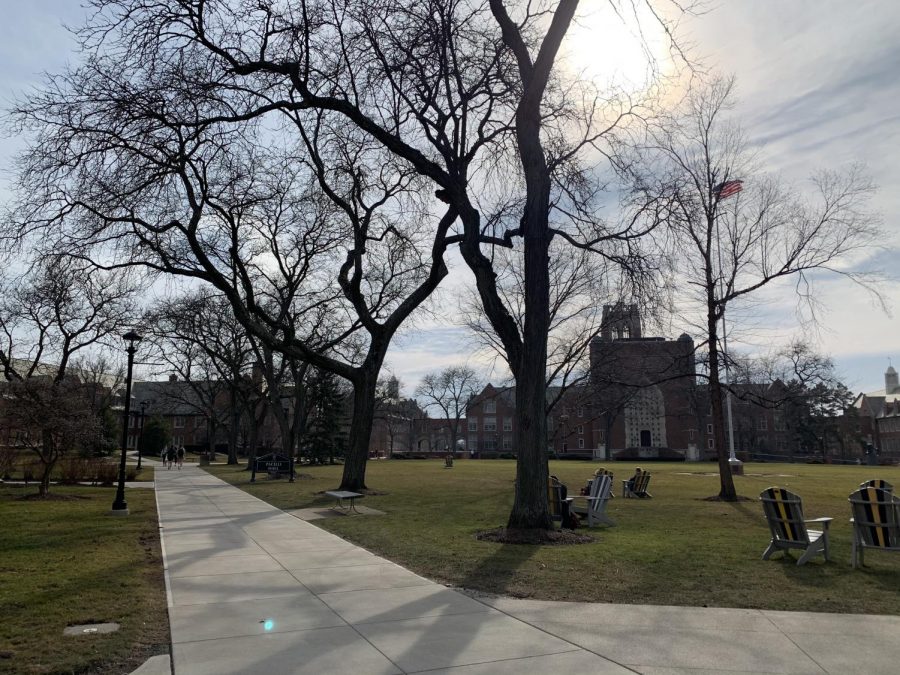JCU faculty faces tenure troubles
“If tenure is the glue that binds us to John Carroll, the Board’s hardship amendment is a big bottle of Goo-Gone.”
The Carroll News says goodbye to JCU’s retiring faculty.
Mar 11, 2021
John Carroll University faculty is in uproar after the administration approved new amendments, which grant them the ability to fire tenured faculty during “financial hardship.” The decision created a panic among JCU professors as their job security now hangs in the balance.
In the academic arena, tenure has reportedly been dying for years now. According to Inside Higher Education, “some 73% of all faculty positions are off the tenure track.” This is reportedly due to the “casualization” of employment in academia; universities are offering fewer tenure track positions. As the workforce dwindles, so does the chance of tenure for teaching hopefuls. Inside Higher Education also recently published an article about John Carroll’s tenure situation, describing it as the University “shooting [itself] in the foot.”
For many professors, tenure protects education and their rights to teach the necessary course material. Tenured professors do not have to worry about being terminated for addressing sensitive topics.
“Tenure is a part of our actual contract with the University, namely JCU’s Faculty Handbook,” Kristen Ehrhardt, a professor of classics at John Carroll, told The Carroll News. “It ensures that I have the freedom to teach my students about potentially controversial things and not be fired. In Classics classes, this means teaching about ancient and modern slavery, about sexual assault, about same-sex relationships in antiquity, even about the ways in which Nazis (and now neo-Nazis) have appropriated classical images as a part of their propaganda. All of these are touchy subjects, but they are incredibly important for us to think about.”
Others rely on tenure for reputational purposes. Being a tenured individual displays the amount of work a professor has done.
“Securing tenure is the main career goal for every academic,” Marcus Gallo, a history professor at JCU, told The Carroll News. “Gaining tenure means that you have proven yourself as a researcher and teacher. It also involves a service component because professors serve on various committees inside and outside the University that are critical in running the University, academic journals and professional conferences.”
One of the largest reasons professors pursue tenure is the promised job security. While the University remains afloat, tenured professors are guaranteed employment unless they commit an action that harms them or their students. Tenure prevents the termination of faculty members for no reason.
“Tenure gives faculty a uniquely long-term perspective — our jobs are tied to the long-term viability of the institution, and as a result we engage in a lot of behind-the-scenes work to try to keep it running smoothly,” Ehrhardt said.
“The University’s administration has perpetrated a bait-and-switch on professors, students and alumni,” Gallo continued. “Professors thought they were applying for tenure-track jobs and would not have even applied for jobs at this University had they known that their tenure protections would be replaced with the current state of the Handbook.”
Now, professors at John Carroll are fearing for their job security with the Board of Directors recent decision regarding faculty tenure. Those who were originally promised a tenured position now have less protections.
Last September, the Board of Directors relieved two tenured faculty of their positions in the Art History Department. This decision alone displeased many in the JCU community. Professors claim that their concerns about the Handbook were ignored and the Board continued with their plan.
“In a sense, faculty were somewhat prepared for that shock because over the summer, the administration had already ignored the provisions of the Handbook by 1) shutting down the Art History department without following proper protocols and 2) reducing faculty and staff salaries by up to 10% (after annual contracts had already been issued to faculty) to ‘avoid financial exigency’ at the same time that University officials repeatedly stated that financial exigency was not imminent,” Gallo stated.
While the community is in shock over the most recent decision to virtually eliminate tenure, the faculty face half a year’s worth of debate coming to fruition.
“The process of amending the Handbook has been going on for about six months,” Gallo said. “The Board’s original budgetary hardship amendment came as a complete shock in September because they made no effort to engage the faculty in any way prior to proposing an amendment to the Faculty Handbook. Typically, the Handbook is amended by [the] faculty, and the Board approves those amendments. According to the Handbook, the Board has the right to propose amendments to the Handbook and unilaterally implement those amendments regardless of a faculty vote. Despite that provision being in the Handbook, the faculty never suspected what occurred this year for several reasons.”
According to Gallo, the Board of Directors had never proposed a decision of this nature,and the Board never attempted to work with faculty to negotiate a deal regarding the new amendment. Gallo also remarked that the Board’s use of “budgetary hardship” could be misconstrued at times, allowing more leniency on terminations.
While the JCU community has rallied together to support tenure for the faculty, many professors are preparing to fight for their occupational rights.
“After the Board proposed their amendments, faculty passed a motion by a vote of 100-2 for the Board to shelve the budgetary hardship amendment and enter negotiations with faculty to solve the budgetary issues facing the University,” Gallo told The Carroll News. “We had numerous meetings with the Board to explain our position, and they consistently demonstrated an unwillingness to compromise on the question of tenure.”
Other faculty have reportedly commenced their search for other employment. One faculty member has already resigned citing this issue and, according to Gallo, many are already seeking other options.
“If this amendment takes effect, I believe that many faculty will leave this school,” Ehrnhardt stated. “This is a breach of our contract. Many of us have made great sacrifices when we became faculty here all because we love this work and love this place. Many of us have moved great distances away from our families, many of us could make more money in other jobs, but we’ve all ultimately chosen to work here — and the stability that tenure gives us was a big selling point.
“While it seems like faculty in the humanities are most at risk of having their positions eliminated, I suspect that faculty across campus are examining their options and are contemplating leaving. If tenure is the glue that binds us to John Carroll, the Board’s hardship amendment is a big bottle of Goo-Gone.”
Currently, professors are not only worried about their own employment but about the quality of education that their students will receive due to this decision. Both Ehrnhardt and Gallo fear for the future of their pupils.
“This will have a permanent impact on professors, students and alumni,” Gallo said. “The University will not be able to attract or retain many high-quality professors. This will inevitably affect the actual quality of instruction at the University, as well as the University’s reputation (for example, its U.S. News ranking). When a University’s reputation declines, this affects the perceived quality of the degrees it issues.
“The effect on students and alumni is just as clear — over time, their degree will lose value, and it will become harder to parlay a John Carroll degree into a good job. Current students, their parents and alumni were promised an excellent education at a prestigious institution that valued teaching and academic freedom. Instead, they will end up with devalued degrees.”
“An exodus of professors could in turn have huge repercussions for students and alumni,” Ehrnhardt said. “Of course, bad press is bad for the reputation of our school. What will ‘John Carroll University, BS, 2021’ on a resume mean to employers? But students often depend on their professors’ continual employment at a University long after they have graduated. Tenure also ensures that we’ll still be around to help our students long after they’ve graduated.”
The Board has not given any indication that they will change their decision. Until then, the faculty say that they will continue to fight for their tenure rights.
Editor’s note: Read what JCU students think about tenure at the University.














